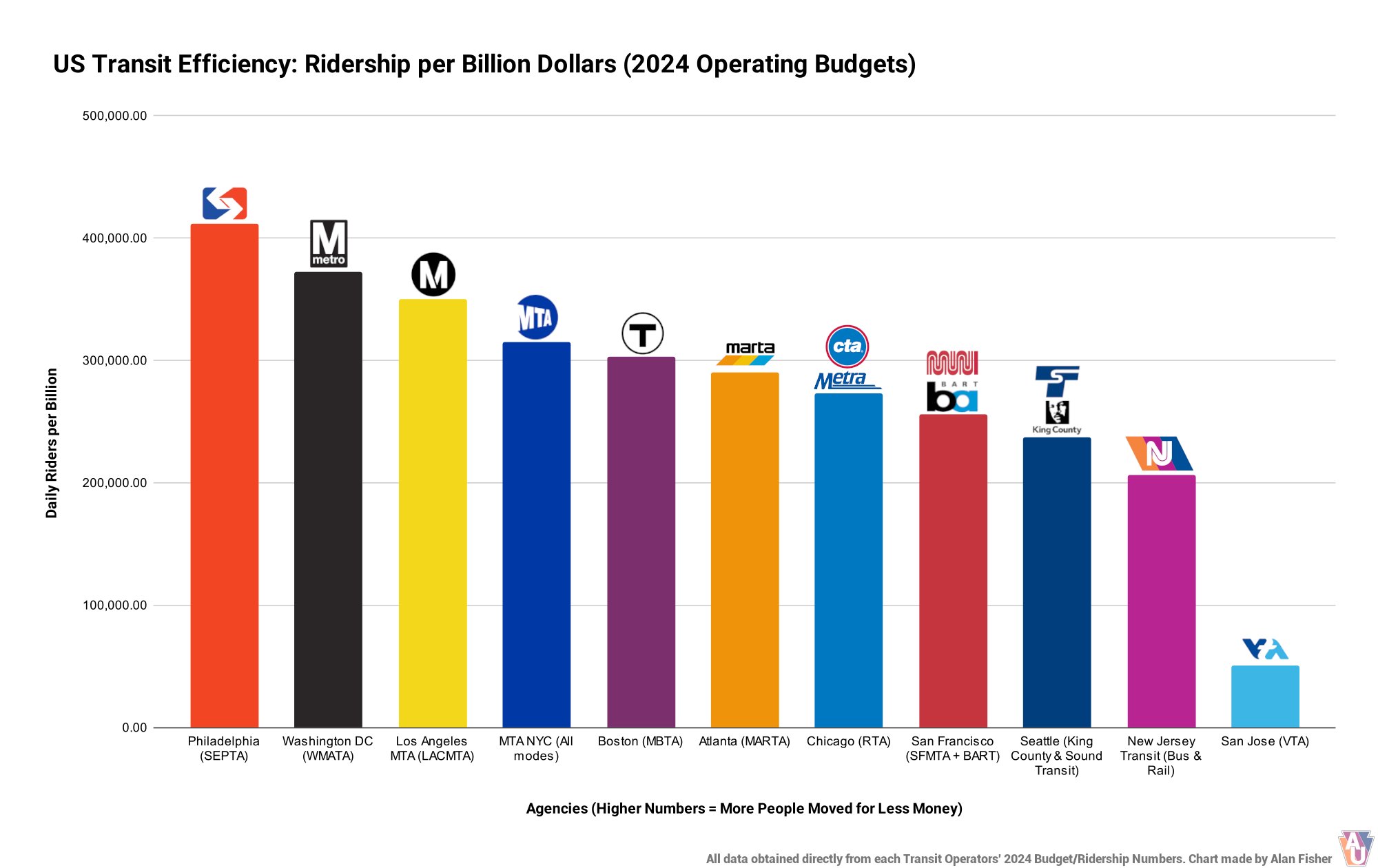Take one minute to write to your representatives now
Privatizing SEPTA will lose money.
Some have suggested that SEPTA should use private contractors to operate its transit system. While many transit authorities employ this strategy, they are less efficient than SEPTA!
| Transit System | Cost Per Mile (vs SEPTA) | Cost Per Trip (vs SEPTA) | Contracted Services |
|---|---|---|---|
| SEPTA | $1.73 | $7.31 | Demand Response, Route 204 Bus |
| Austin CapMetro | $2.83 (+63.58%) | $14.18 (+93.98%) | All Transit Services |
| Maryland MTA | $2.68 (+54.91%) | $15.86 (+116.96%) | Bus, Rail, Demand Response |
| Denver RTD | $1.99 (+15.03%) | $11.78 (+61.15%) | Half of Busses, Rail, Demand Response |
| SEPTA (Commuter Rail Only) | $1.21 | $16.56 | |
| Metra* | $1.27 (+4.96%) | $28.03 (+69.26%) | Commuter Rail |
* Metra only operates commuter rail services, so it is compated to SEPTA's commuter rail figures.
SEPTA is already the most efficient transit system in the United States of its size
SEPTA has the most ridership per operational budget dollar compared to other agencies operating in large population centers. This includes cities that are widely regarded as having world-class metro systems like Washington, D.C. and New York City. Even SEPTA's neighbor NJ Transit is far behind SEPTA in efficiency. SEPTA knows how to do its job. We need to give them the tools do do it.

Private operators do not operate in a free market
A well-functioning free market depends on healthy competition to drive efficiency, innovation, and accountability. While some may believe that contracting out transit operations would introduce these dynamics by inviting private firms to compete for service delivery, in practice, the structure of transit contracting creates high switching costs that limit true competition. Changing operators is not as simple as choosing a different coffee shop. It involves transferring fleets, staff, infrastructure, and operational systems, all while maintaining uninterrupted service to the public. These transitions are expensive, time-consuming, and politically sensitive, which often discourages agencies from making changes even when contractors fail to deliver.
The challenges of this model were made clear in the long-running dispute between Metra and Union Pacific. Although Union Pacific was operating commuter rail service under Metra's oversight, a breakdown in their relationship led to Union Pacific halting fare collection for over a year [2]. This move, which was described as a strategy to "bleed Metra dry," severely impacted revenue without offering Metra a realistic path to end the agreement or quickly find a new operator [2]. Despite clear dysfunction, the barriers to switching providers were too high. This example highlights how transit contracting, rather than fostering accountability and performance, can leave public agencies locked into unstable and unproductive partnerships with little recourse.
Years after the dispute, Metra ultimately ended its relationship with Union Pacific due to ongoing operational challenges and a breakdown in trust. Metra now directly operates the UP lines, having taken over responsibility to ensure greater control and accountability.
Private operators do not have SEPTA's operational experience
SEPTA is unique among American transit agencies in that it operates all five major terrestrial transit modes: regional rail, heavy rail, light rail, trolleybus, and motorbus. No other single authority in the United States manages this full range of services under one system. This integrated structure allows SEPTA to coordinate schedules, manage resources across modes, and plan for long-term system improvements in a way that fragmented or privatized systems cannot. Its comprehensive oversight supports a level of operational cohesion and responsiveness that is difficult to replicate with multiple private contractors or siloed agencies.
With more than 60 years of institutional knowledge, SEPTA has developed deep expertise in managing the complexities of multimodal transit in a dense and historically built environment, and it does so extremely efficiently. Private operators, even those with national or international portfolios, do not bring this level of localized experience or understanding. They may have knowledge of bus or rail operations in general, but they lack the specific insights needed to navigate Philadelphia’s infrastructure, regulatory landscape, and community expectations. Replacing SEPTA's in-house operations with contracted services would risk losing this accumulated knowledge and could lead to service disruptions, coordination failures, and reduced accountability. The value of experience is not just in years, but in the ability to adapt, integrate, and respond effectively across a diverse and demanding transit network.
Privatizing SEPTA's operations is fiscally irresponsible.
[1] NTD Transit Agency Profiles - The United States Department of Transportation
[2] A bittersweet look back at 12 months of free Metra Union Pacific line rides - STREETSBLOG CHICAGO